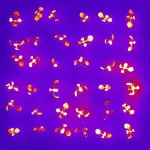(Press-News.org) MSU has a satellite uplink/LTN TV studio and Comrex line for radio interviews upon request.
EAST LANSING, Mich. – A team of Michigan State University scientists has unveiled a potential game-changer in the fight against glioblastoma, the most common and currently incurable form of brain cancer.
A team of Michigan State University scientists has unveiled a potential game-changer in the fight against glioblastoma, the most common and currently incurable form of brain cancer.
Their weapon of choice? A drug-like compound named Ogremorphin, or OGM. In laboratory experiments, OGM showed a remarkable ability to kill glioblastoma cells while leaving normal cells unharmed.
Charles Hong, the chair of the Department of Medicine at MSU College of Human Medicine, who led the study, published in the journal Experimental Hematology and Oncology, declared it an “early but extremely promising path to a cure.”
What makes OGM special lies in its precision. The researchers targeted an acid sensor called GPR68/OGR1 on the cancer cell membranes, disrupting a crucial signaling pathway that cancer cells rely on to survive and grow.
“Because glioblastoma cells acidify their tumor environment and then use the acid-sensing receptor to survive, the OGM compound essentially cuts off their lifeline,” Hong explained. “We haven't found a single brain cancer cell line that it can’t kill.”
Hong led the study along with his College of Human Medicine colleagues Charles Williams and Leif Neitzel, as well as with researchers at the University of Maryland School of Medicine and the Johns Hopkins University School of Medicine.
Hong believes this groundbreaking research isn't confined to glioblastoma alone. Since other cancer types are also known to acidify their tumor environment to thrive and evade traditional therapies, this discovery could also lead to treatments targeting other types of cancer.
The reality of brain cancer is that, even with the standard treatment that combines brain surgery, chemotherapy and radiation therapy, the median survival period is 15 to 18 months following diagnosis, with a five-year survival rate of around 10%. Such an outcome is due to cancer recurrence and treatment resistance.
“We found an explanation for how an acidic tumor environment enables the cancer cells to survive and evade chemotherapy, and at the same time, we found a drug candidate that blocks this survival pathway to selectively kill them without touching normal cells,” Hong shared.
“This is just a first step,” he added. “Developing a treatment for human glioblastoma patients will take years of research. We hope to have human trials within five years.”
END
MSU researchers find early, promising glioblastoma treatment
2024-02-05
ELSE PRESS RELEASES FROM THIS DATE:
Are body temperature and depression linked? Science says, yes
2024-02-05
People with depression have higher body temperatures, suggesting there could be a mental health benefit to lowering the temperatures of those with the disorder, a new UC San Francisco-led study found.
The study, publishing today in Scientific Reports, doesn’t indicate whether depression raises body temperature or a higher temperature causes depression. It’s also unknown whether the higher body temperature observed in people with depression reflects decreased ability to self-cool, increased generation of heat from metabolic processes or a combination of both.
Researchers analyzed data from more than 20,000 international ...
Persons diagnosed with PCOS face 8-fold increase in suicide risk
2024-02-05
Embargoed for release until 5:00 p.m. ET on Monday 5 February 2024
Annals of Internal Medicine Tip Sheet
@Annalsofim
Below please find summaries of new articles that will be published in the next issue of Annals of Internal Medicine. The summaries are not intended to substitute for the full articles as a source of information. This information is under strict embargo and by taking it into possession, media representatives are committing to the terms of the embargo not only on their own behalf, but also ...
Mental health care during the COVID-19 era remains inaccessible to many distressed US adults
2024-02-05
U.S. adults experienced considerable psychological distress and adverse mental health effects as a result of the COVID-19 pandemic according to a study at Columbia University Mailman School of Public Health and Columbia University Irving Medical Center. Based on insurance claims, mental health care provider surveys, and electronic health records the research further revealed a decline in in-person outpatient mental health visits during the acute phase of the pandemic. Findings are reported ...
Magnesium protects tantalum, a promising material for making qubits
2024-02-05
UPTON, NY—Scientists at the U.S. Department of Energy’s (DOE) Brookhaven National Laboratory have discovered that adding a layer of magnesium improves the properties of tantalum, a superconducting material that shows great promise for building qubits, the basis of quantum computers. As described in a paper just published in the journal Advanced Materials, a thin layer of magnesium keeps tantalum from oxidizing, improves its purity, and raises the temperature at which it operates as a superconductor. All three may increase tantalum’s ability ...
From Colombia to Laos: protecting crops through nanotechnology
2024-02-05
In a recent breakthrough, DNA sequencing technology has uncovered the culprit behind cassava witches’ broom disease: the fungus genus Ceratobasidium.
The cutting-edge nanopore technology used for this discovery was first developed to track the COVID-19 virus in Colombia, but is equally suited to identifying and reducing the spread of plant viruses. The findings, published in Scientific Reports, will help plant pathologists in Laos, Cambodia, Vietnam and Thailand protect farmers’ valued cassava harvest.
“In Southeast ...
New guideline details acute pain management strategies for adolescent, adult dental patients
2024-02-05
CHICAGO, Feb. 5, 2024 – Nonsteroidal anti-inflammatory drugs (NSAIDs) taken alone or along with acetaminophen are recommended as first-line treatments for managing short-term dental pain in adults and adolescents aged 12 or older, according to a new clinical practice guideline developed by the American Dental Association (ADA), the University of Pittsburgh School of Dental Medicine and the Center for Integrative Global Oral Health at the University of Pennsylvania School of Dental Medicine. The guideline has been endorsed by the ADA and is now available in the February issue of The Journal ...
How ‘deaths of despair’ differ by race and ethnicity
2024-02-05
COLUMBUS, Ohio – White Americans are more likely than Black and Hispanic people in the United States to experience “deaths of despair” even though they are less likely to suffer from severe psychological distress, a new study finds.
The results suggest that, for some reason, whites are more vulnerable to the damaging effects of psychological distress than Blacks or Hispanics, said Hui Zheng, lead author of the study and professor of sociology at The Ohio State University. Zheng is currently on leave at the University of Hong Kong.
“The white population has an increasing trend of despair-related mortality after 2000,” Zheng said. ...
Understanding how soil traps carbon
2024-02-05
EVANSTON, Ill. — When carbon molecules from plants enter the soil, they hit a definitive fork in the road.
Either the carbon gets trapped in the soil for days or even years, where it is effectively sequestered from immediately entering the atmosphere. Or it feeds microbes, which then respire carbon dioxide (CO2) into the ever-warming environment.
In a new study, Northwestern University researchers determined the factors that could tip plant-based organic matter in one direction or the other.
By combining laboratory experiments and molecular modeling, researchers ...
USC researchers uncover biological circuit that protects plants from extreme conditions
2024-02-05
Climate change is already harming agricultural yields and may one day pose a significant threat to the world’s food supply. Engineering more resilient crops, including those able to thrive in the face of drought or high soil salinity levels, is an increasingly urgent need.
A new study from the Keck School of Medicine of USC, funded in part by the National Institutes of Health, reveals details about how plants regulate their responses to stress that may prove crucial to those efforts. Researchers found that plants use their circadian clocks to respond to changes in external water and salt levels throughout the day. That same circuitry—an ...
Study reveals significant discrepancies in common poverty measurement approaches
2024-02-05
Methods commonly used to measure poverty can lead to vastly different conclusions about who actually lives in poverty, according to a new Stanford University-led study. Based on household surveys in sub-Saharan Africa, the first-of-its-kind analysis, published Feb. 5 in Proceedings of the National Academy of Sciences, underscores the importance of accurately defining and measuring poverty. Its findings could help inform how governments, nonprofit organizations, and international development agencies allocate resources and evaluate the effectiveness of poverty-alleviation policies around the world.
“They say you can’t manage what ...



